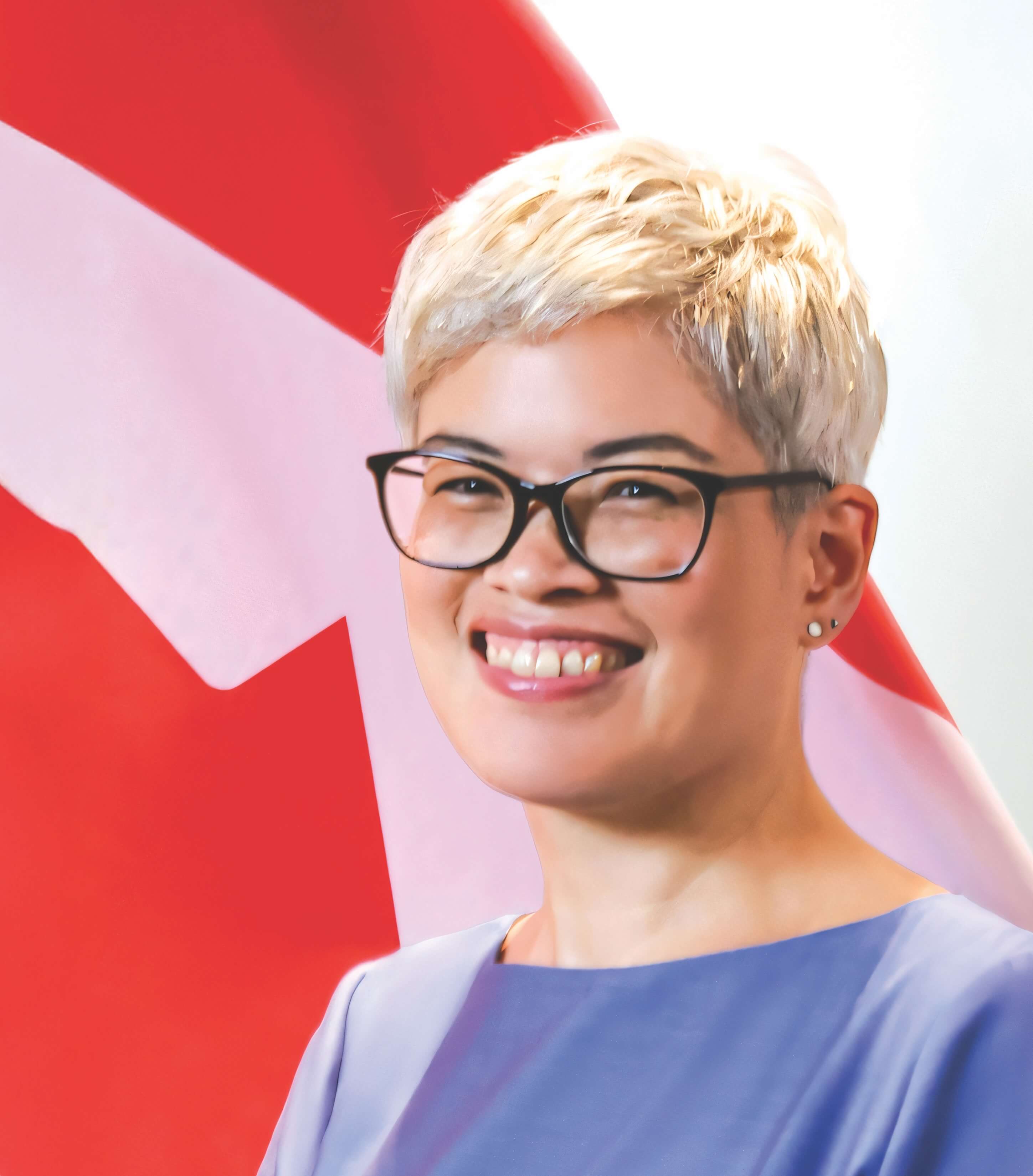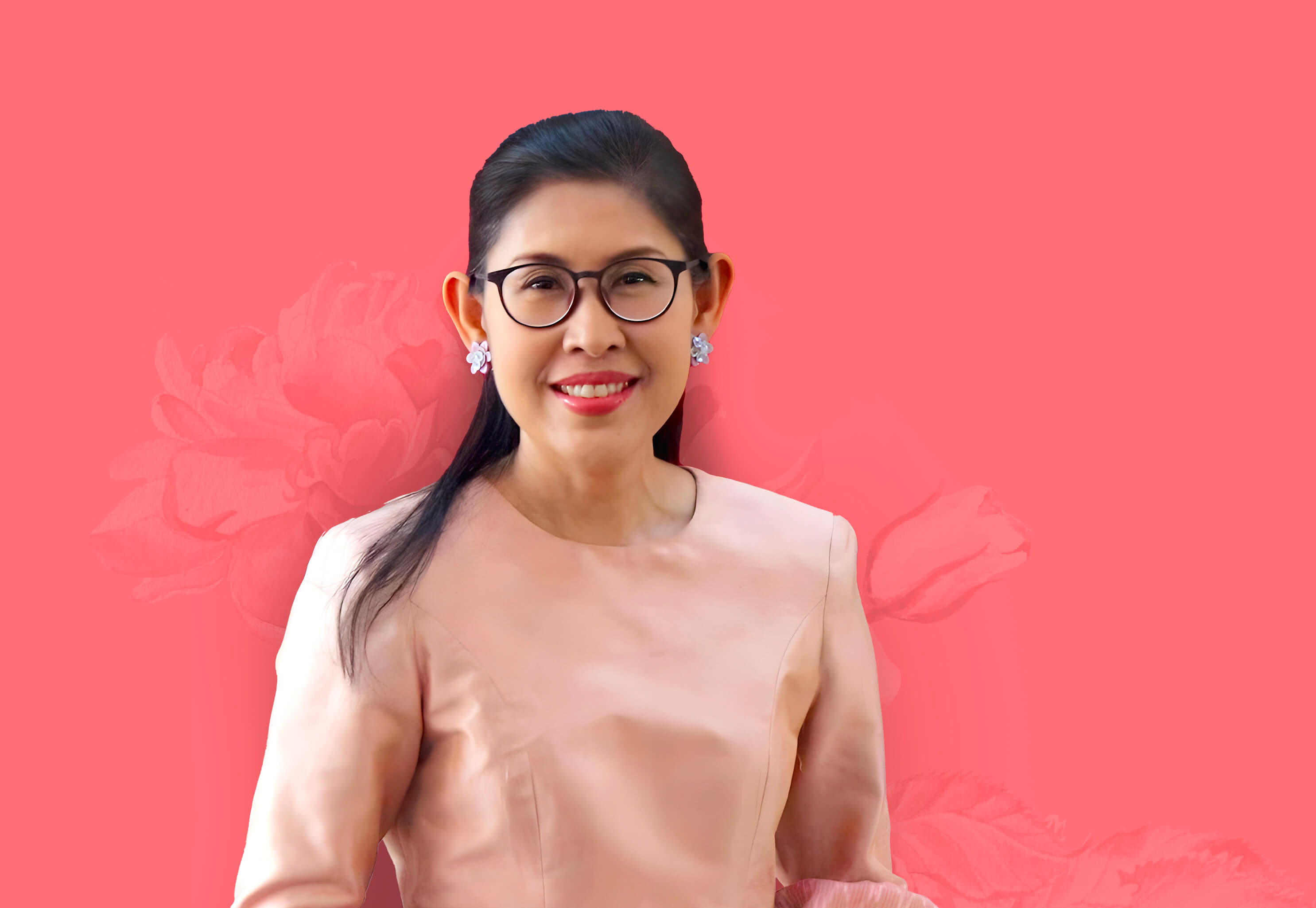


Dr. Mari Elka Pangestu addresses issues of power, representation, and equality. Before joining the World Bank as a managing director in 2020, she held various leadership positions in the Indonesian government, including as Minister of Trade (2004-2011) and as Minister of Tourism and Creative Economy (2011-2014).
Global statistics on gender show an increasing number of women holding executive positions and political power. To what factors do you attribute this positive change?
I see it more as an ongoing process. In Southeast Asia, we’ve had women leaders at the highest level— Megawati Sukarnoputri, Corazon Aquino, to name a few—and also at the ministerial level. I can only speak for my own country Indonesia, but the inclusion of women was part of the whole democratisation process. Under President Megawati, political parties had to meet a quota, where 30 per cent of candidates for parliament had to be women. Then, there was a push to put women in substantive positions, not just in women’s affairs. President Yudhoyono appointed women to two very key portfolios— finance and trade. It broke the barrier, showing that women can deliver well in important positions, and was followed by the subsequent president who had even more women ministers, including Foreign Affairs. Across the region today, you see women as ministers. Many of these leaders have come into their positions on merit, technocratic ability and performance.
How can this momentum be accelerated to ensure that women are represented at all levels of decision-making, especially in Southeast Asia?
There has to be the political will to involve women at all levels of decisionmaking, down to the village level. When you’re designing a policy, you have to think about the gender dimension. Applying this gender lens is what we are doing at the World Bank and what I also did when I was in government.
How do you make sure this happens? You need to institute it in the processes that you have, then enforce it effectively. Let me share one of my favourite examples.
When I was a minister of trade, I had to revitalise the traditional market. After visiting many of them, I noticed that 90 per cent of the traders and the majority of the shoppers were women. I also saw young children running around the market while their mothers were working. But every market was designed in the same cookie-cutter manner. So, we changed the design to meet requirements for women—more toilets with space for breastfeeding, and a child care centre within the market. These became profit centres because users would pay. Applying a gender lens means you really need to think things through, be committed, then implement.
Support systems are also very important, which will help more women enter leadership positions. I was impressed with former U.S. Secretary of State Hillary Clinton, who emphasised that equal pay, childcare, and family leave are not just women’s issues but also economic ones. There is a funnel effect when it comes to women who fall out before reaching top levels of management. Part of this is due to unfairness in how promotions are handled and lack of adequate support systems for work-life balance as we go up the career ladder. Promotion criteria need to have flexibilities built-in for womens’ situations, and there needs to be better support for women to balance work, and childcare and family responsibilities. How we involve men is also important, such as providing not just maternity but also paternity leave.
You have served as a Cabinet Minister for 10 years and are now occupying a senior management position at World Bank. What important leadership lessons have you learned that are unique to being a woman leader from Southeast Asia?
There is an unconscious bias that persists, perhaps even more so in the Asian context, that it’s negative for a woman to be ambitious and decisive. You need to manage that and show that you can lead, but that doesn’t mean you have to be aggressive. You can be a good leader by having empathy while firm in your decision-making. I also think listening is very important in a leader, especially in a democracy. You need to listen well and understand different views, then come up with a decision.
I heard recently that one reason Nancy Pelosi, Speaker of the U.S. House of Representatives, was able to succeed as a politician is because she had five children, who she had to negotiate with to maintain peace in the family. This is a good point. Women often have to manage families and multiple aspects of daily life. Maybe this helps us become better managers of different viewpoints. Women are also good at multitasking. I always say that my brain is divided into ten—from discussions at work to children and homework. These are all attributes of good leaders.
Have you ever experienced bias or discrimination as you rise up in your career (e.g. pay gap, unfavourable gender policies, sexism, racism)? How did you handle it?
I am a triple minority—a woman, ethnic Chinese and Catholic in a majority Muslim country. I did face bias and discrimination, which I managed by showing that I am as nationalist as anyone else. Another dimension is that I lived and studied abroad for 20 years and had to adjust to circumstances coming back home as a young woman. I am quite used to being the “odd person out” in any situation, but I’ve learned to survive through observation. You have to observe to understand norms and be respectful, then adjust to reduce suspicion or biases that people may have against you because you are from a different background. But you don’t want to adjust to the point where you lose your own identity. One thing I learned early on is that you can deal with these issues with an open mind, and if you show respect and sincerity, you can also earn respect and trust. You also have to be patient because it takes time to get to that point, but you have to be the one to take the first step to begin the conversation and to understand each other’s perspectives.
How are you able to manage a work-life balance? What support do woman need to achieve this?
There’s no right or wrong answer to work-life balance, but don’t believe the fairy tale that you can have it all, because you really can’t. You’ll always feel a level of guilt that you didn’t attend your child’s concert or whatever else. You need to balance it as best you can, manage the stress that comes with it and ensure that your child or spouse has the means to communicate with you, no matter how busy you are. It’s much easier if you have a network of extended family and friends. One important network is the parents of your children’s friends. They can alert you and tell you to pay special attention when something is wrong, such as when your child broke up with a girlfriend or other matters. You need these alerts to know what’s going on.
What advice can you give to Southeast Asian women aspiring to break the glass ceiling or be in leadership positions?
One is to always push yourself beyond your comfort zone. I was a bit of an eager beaver which helped me rise throughout my career. Have the confidence to take on a task and show that you can deliver, even if you’ve never done it before. But remember that it’s not about your personal ability to deliver or getting credit. It’s about your ability to work with others, to collaborate and bring others along, which in turn helps you to build a network. I’m a great believer in networks. When they need you, offer help or advice, and there will come a time when you may need to call on them. That’s how I was able to survive!
Another is mentoring. Especially when you’re young, look for good mentors who will look out for you and help you. Good mentors can help open doors, tell you whether you are doing something right or wrong, and give you good advice. Being confident is also important. Many women have self-esteem and confidence problems, but you can assert your opinion without being aggressive. Make sure that your opinion is well-substantiated, and people will listen to you because you have the evidence or your argument is well thought through.
What are World Bank’s current initiatives to empower women, especially in response to COVID-19? Can you elaborate on its recent venture to support women-led enterprises?
Women’s economic empowerment is important as a fundamental human right, but it’s also critical to achieve the kind of development that we envision in the post-COVID-19 world—a development that is green, resilient, and inclusive— especially since this pandemic has disproportionately affected women.
The World Bank Group’s gender equality strategy focuses on four key areas where countries and companies can focus on investments: health and education; jobs; ownership and control of land, housing and bank accounts; and voice and agency. The majority of our operations and strategies now aim to close specific gender gaps through analysis, smart design in interventions, and monitoring and evaluation of our work.
In our projects responding to COVID-19, we are taking care to consider the different impacts of the pandemic on men and women. Women and girls are experiencing disruptions to reproductive health services in some countries. School closures may put girls at a higher risk of not returning, limiting their learning and future opportunities. Women-owned and -led micro, small and medium enterprises (MSMEs) have closed or seen higher sales and profit losses than male-owned firms. According to recent research covering 48 countries, the difference in the rate of work stoppage is seven percentage points higher for women than for men.
Looking forward, addressing the structural barriers that have limited opportunities for women and girls pre-pandemic will create a stronger and more resilient recovery. This includes expanding social safety nets and building in economic inclusion, expanding the availability of childcare, and addressing gender-based violence and its underlying causes. A legal environment that encourages and incentivises women’s work can create economic opportunities and make women more resilient not only in the face of crisis but throughout their lives and careers. Our Women, Business and the Law programme analyses laws and regulations affecting women’s economic inclusion in 190 economies to inform policy reforms that will advance women’s economic empowerment.
In terms of support for women-led enterprises, we host the Women Entrepreneurs Finance Initiative (We-Fi), which was founded in 2017. It brings together 14 governments that have contributed over 350 million US dollars, six multilateral development banks that serve as implementing partners, and a variety of public and private sector actors.
How do you see emerging changes in the employment landscape, such as artificial intelligence and automation, impacting women’s leadership?
I think the answer is two- fold. We have to make sure that the digital revolution is an inclusive process that empowers women. Accelerating the digitalisation of government and private sector payment platforms and services will reduce women’s information and mobility constraints. This includes addressing barriers to access, affordability, knowledge and skills, safety and security, as well as making relevant content, products, and services more available to women. Digitalisation can be a game-changer for women if they are included front and centre in design. When the services sector is digitally enabled, it can make it possible for more women to work from home. Digital skills and automation can support women in continuing to be part of the workforce, which can better prepare them for promotions and leadership positions.








